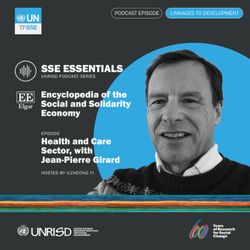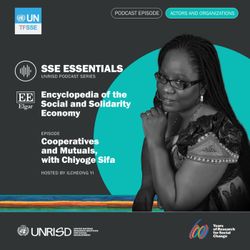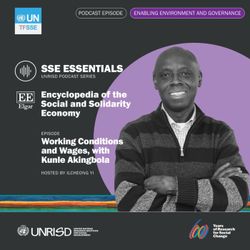Share

UNRISD Podcasts
Legal Frameworks and Laws, with David Hiez
In this episode, David Hiez, Professor of Law at the University of Luxembourg, gives an overview of why it is important to recognize the Social and Solidarity Economy (SSE) through legislation and laws. For Hiez, alternative economies such as SSE can tell a different story and become a new model for economic and productive activities as well as for the ways in which we build societies and relate to each other. Even though legislation is important to find a common understanding across practices and to consolidate SSE on a larger scale, a cautionary tale must also be told so that international instruments such as legislation and legal frameworks do not risk curtailing the potential for change of SSE initiatives and enterprises by imposing parameters and technicalities too strict or limiting.
To read the encyclopaedia’s entry on legal frameworks and laws of SSE, click here.
More episodes
View all episodes

12. Health and Care Sector, with Jean-Pierre Girard
07:30||Season 1, Ep. 12In this episode, we are joined by Jean-Pierre, an expert in cooperative, mutual, and associative movements within the health sector, both in Canada and internationally. Jean-Pierre shares his personal journey into the world of Social and Solidarity Economy (SSE) and reveals what sparked his deep interest in coops, mutuals, and associations. Throughout the discussion, Jean-Pierre explains why SSE is particularly pertinent to current health issues. He delves into the critical role that SSE organizations play in addressing health challenges and promoting well-being, emphasizing their unique ability to foster community-based solutions and inclusive care models and introduces diverse types and forms of SSE organizations that are making a difference in health and care across various regions of the globe.Read the encyclopedia’s entry on health and care sector.
11. Cooperatives and Mutuals, with Chiyoge Sifa
15:59||Season 1, Ep. 11In this episode, Chiyoge Sifa, the Regional Director of the International Cooperative Alliance–Africa, shares how she witnessed first-hand the way the actualization of the principles and values of the Social and Solidarity Economy (SSE) such as equity, solidarity and participatory governance help improve the lives of those around her. She explains her conviction that SSE is intrinsic to humanity, cutting across many cultures in different regions around the world and stemming from the roots and origins of the way we work. She envisions the future potential of cooperatives and the SSE movement on the continent of Africa as paramount to the achievement of the UN’s Sustainable Development Goals by 2030.Read the encyclopedia’s entry on cooperatives and mutuals.
10. Working Conditions and Wages, with Kunle Akingbola
18:38||Season 1, Ep. 10In this episode, Kunle Akingbola, a professor of HR organizational behaviour and expert in the organizational dynamics of Social and Solidarity Economy (SSE) entities, explores the relationship between business schools, human resources management and the SSE and how they relate to working conditions and wages. He draws attention to how recruiting, retaining and motivating employees and engaging the community are central to the effectiveness of SSE entities, despite university courses and business schools not yet fully comprehending the importance of these connections. In his entry in the SSE Encyclopedia, he highlights how both internal (organizational mission and values) and external (funding predictability in the case of non-profits) factors influence how SSE organizations attract, retain and motivate employees, a critical component for understanding how employees, managers and even policy makers can positively impact the outcomes of the SSE.Read the encyclopedia’s entry on working conditions and wages.
9. Financing the SSE and the Finance Sector, with Riccardo Bodini and Gianluca Salvatori
20:57||Season 1, Ep. 9In this episode, Riccardo Bodini and Gianluca Salvatori introduce the European Research Institute on Cooperative and Social Enterprises (EURICSE), its activities, and what the Social and Solidarity Economy (SSE) means to them. They explore why SSE is relevant in today’s world and the evolution of the SSE movement, moving from the margins to the mainstream. In their entries in the SSE Encyclopedia, Gianluca highlights the importance of “social” in social finance for addressing SSE needs and finance sector dynamics, while Riccardo discusses the positive impacts of SSE finance entities in meeting the needs of both SSE organizations and individuals, offering an alternative to conventional financing.Read the encyclopedia’s entries on financing the SSE and the finance sector.
8. Social Services, with Susanne Elsen
14:37||Season 1, Ep. 8In this episode, Susanne Elsen, a professor of sociology, explores the innovative power of the Social and Solidarity Economy (SSE) within the field of social services, especially in disadvantaged and remote regions. Within the context of social services, the SSE can be appealing to youth by giving young people the power to act and to be creative in broader community development for an eco-social transition. She highlights that the main difference between social services provisions from the SSE and the public is the bottom-up participation linking to collective action and the emphasis on concrete local needs. This, in turn, could stimulate local innovation and provide the enabling environment for self-determination and personal prosperity.Read the encyclopedia’s entry on social services.
7. Youth, with Davorka Vidović
08:40||Season 1, Ep. 7In this episode, Davorka Vidović, a sociologist from the University of Zagreb, defines respect toward people and nature as both a key value of the Social and Solidarity Economy (SSE) and as an enabler of a human-centred economy. She shares that SSE can be attractive for youth because it can provide them with the space for creativity and the opportunity to participate and be engaged in decision making on aspects that matter in their life. Contrary to the mainstream model, which they may feel increasingly disconnected from, the SSE can provide youth with a sense of belonging and help build long-lasting and meaningful connections in their transition to adulthood.Read the Encyclopedia’s entry on youth.
6. Food, Agriculture and Reduction of Hunger and Poverty, with Judith Hitchman
08:12||Season 1, Ep. 6In this episode, Judith Hitchman, a seasoned activist, shares her experiences on the relationship between food sovereignty and the Social and Solidarity Economy (SSE). For Hitchman, the SSE provides the impetus toward system change necessary to achieve food sovereignty. She identifies the need for policy change to enable the SSE to further drive system change, including the empowerment of communities at the local level and within the water, health, finance and food systems. She emphasizes the promotion of indigenous systems, the SSE, and social movements within the food and agriculture system as levers for change to reduce poverty and hunger. Read the eencyclopedia’s entries on reduction of hunger and poverty and food and agriculture.
5. The Sustainable Development Goals, with Denison Jayasooria
12:19||Season 1, Ep. 5In this episode, Denison Jayasooria, a sociologist by training who is currently active in social and community work at the grassroots level, shares his concerns regarding questions of justice and exploitation. He gives prominence to the Social and Solidarity Economy (SSE) as an alternative solution for addressing these concerns and shares how the SSE entities work toward self-reliance and resilience. He emphasizes the importance of the income generation model of the SSE entities as a key aspect of the SSE to ensure it is self-sustaining and elaborates on how the SSE entities at the grassroots and community levels can help achieve the SDGs. Read the encyclopedia’s entry on the SDGs and the SSE.
4. Education sector, with Christina Clamp
13:11||Season 1, Ep. 4In this episode, Professor of Sociology Christina Clamp, shares invaluable insights and wisdom gleaned from over 40 years of experience in cooperative movements across Central America, South America, North America and Asia. With a wealth of first-hand knowledge, Professor Clamp provides a comprehensive exploration of cooperative movements, rooted in her concerns about educational inequalities in deeply divided societies. As the co-author of an Encyclopedia entry on Education and the Social and Solidarity Economy (SSE), she adeptly guides us through diverse forms of cooperative-led primary and secondary education, with examples from Brazil, Korea, East Africa, Germany and beyond, highlighting SSE’s profound importance for addressing failures within public education and engendering sustainable development. Read the encyclopedia’s entry on the education sector.